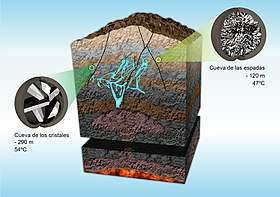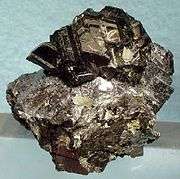Naica Mine
The Naica Mine of the Mexican state of Chihuahua, is a lead, zinc and silver mine that also contains extremely large selenite crystals.[1][2] Located in Naica in the municipality of Saucillo, the Naica Mine is owned by Industrias Peñoles,[3] the world's largest silver producer.[4][5] Caverns discovered during mining operations contain crystals of selenite (gypsum) as large as 1.2 m (4 ft) in diameter and 15 m (50 ft) long. Peñoles announced in October 2015 that it was indefinitely suspending operations due to uncontrollable flooding at the Naica Mine.[6]
The peak underground temperature is 58° C (136° F) with 99% humidity, which interferes with breathing and increases the risk of asphyxiation. Because of the heat, unprotected researchers can only stay up to 10 min inside the cave. Longer visits require the use of a specialized suit with an oxygen supply.
Cave of the Crystals

The Cave of Crystals is a cave approximately 300 m (1,000 ft) below the surface in the limestone host rock of the mine. The chamber contains giant selenite crystals, some of the largest natural crystals ever found.[7][8] The selenite crystals were formed by hydrothermal fluids emanating from the magma chambers below. The cavern was discovered while the miners were drilling through a newly drained area. The caves are closed to the public, and remain closed after a worker tried to enter the cave to steal some of the selenite, only to suffocate and die in the cave's humid and inhospitable atmosphere.[9] After enough research on the crystals has been carried out, some of the chambers will be allowed to flood again and continue the process of crystal growth.
The Cave of Swords
The Cave of Swords is another chamber in the Naica Mine, also containing gypsum crystals but each "only" about a meter long, due to the fact that these crystals are younger and had been growing for much less time by the time they were discovered in 1910.[8]
Gallery
 Selenite crystals from Naica mine. Scale unknown.
Selenite crystals from Naica mine. Scale unknown.
 Sphalerite and galena ore specimen from the Naica mine. Size: 4.7 cm × 3.6 cm × 2.6 cm (1 3⁄4 in × 1 1⁄2 in × 1 in).
Sphalerite and galena ore specimen from the Naica mine. Size: 4.7 cm × 3.6 cm × 2.6 cm (1 3⁄4 in × 1 1⁄2 in × 1 in).
See also
- Let's Talk about Crystallization in the Naica Mine, at Wikijunior books for children
References
- García-Ruiz, Juan Manuel; Villasuso, Roberto; Ayora, Carlos; Canals, Angels; Otálora, Fermín (2007). "Formation of natural gypsum megacrystals in Naica, Mexico". Geology. 35 (4): 327. doi:10.1130/G23393A.1. hdl:10261/3439.
- Van Driessche, A. E. S.; Garcia-Ruiz, J. M.; Tsukamoto, K.; Patino-Lopez, L. D.; Satoh, H. (2011). "Ultraslow growth rates of giant gypsum crystals". PNAS. 108 (38): 15721–6. doi:10.1073/pnas.1105233108. PMC 3179101. PMID 21911400.
- "The Naica Mina". Archived from the original on 2010-11-25.CS1 maint: unfit url (link)
- "Peñoles, the world's top producer of refined silver", Corporate profile, Retrieved June 15, 2019
- Maple mine, known also as Naica, "under Peñoles control since 1964.", Corporate mining operations, Retrieved June 15, 2019
- "Penoles suspends operations at Naica mine in northern Mexico". Reuters. Retrieved 14 October 2015.
- National Geographic, 2008. Cavern of Crystal Giants
- National Geographic, 2007. Giant Crystal Cave's Mystery Solved
- http://www.earthmagazine.org/article/danger-and-wonder-nat-geos-giant-crystal-cave
External links
| Wikimedia Commons has media related to Naica Mine. |
- Naica mine at Peñoles
- Naica Mine at Mindat.org
- Naica Project, comprehensive website on the Crystal Caves with geology, history, photos and videos
- "Naica Crystals Project". Archived from the original on 2007-01-07.CS1 maint: unfit url (link)